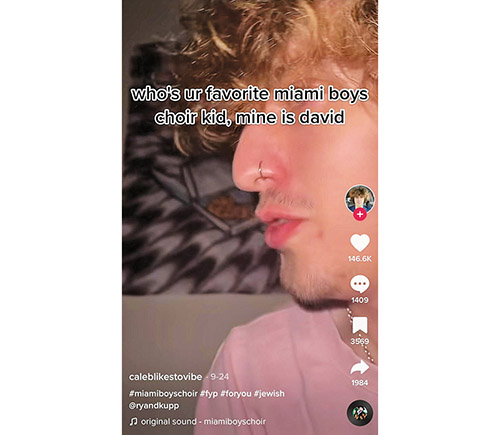




136 million. That’s how many views the hashtag #miamiboyschoir has on the social media platform TikTok, and counting. It all began just a few weeks ago, when the music group led by Yerachmiel Begun posted a short clip of a live performance of their song, “Yerushalayim.” The original video—which features soloists Yoshi Bender, Akiva Abramowitz, David Herskowitz and Binyamin Abramowitz—became a hit on TikTok, collecting a total of nearly nine million views, tens of thousands of comments and fan reposts. In a refreshing turn of events, the response to the Miami Boys Choir has been incredibly positive, and the group has become an instant sensation.
The fans that have appeared on TikTok span well beyond the Jewish realm, many of whom have never been exposed to Jewish music or even the Hebrew language in their lifetime. And still, thousands of videos have been shared of people from all over the world singing the words to “Yerushalayim,” as well as other Miami Boys Choir songs that have been discovered through this viral trend.
“It seems here that the whole world is loving it,” Binyomin Abramowitz, who appears in the original viral clip, shared with The Jewish Link. “It’s incredible. I don’t think anyone anticipated the audience to be so diverse or for the video to reach so many different cultures around the world.”
Binyamin, who is now a medical student at SUNY Downstate, joined the Miami Boys Choir at the age of 8, following in the footsteps of his older brothers, Chanina and Akiva. “For as long as I could remember, I was going to concerts, and I always wanted to be on stage like my brothers. I was very happy when I got in. It was a great experience for me.”
Binyamin appears at the very end of the lineup of soloists in “Yerushalayim,” separated by just one line from his older brother, Akiva. In the clip posted by the Miami Boys Choir TikTok account, Akiva is mistakenly identified as “C. Abramowitz,” and he is unsure whether it refers to his older brother, Chanina, or his younger brother, Chiya, both of whom were a part of the choir. Akiva explained that he is not upset by the mistake, and actually views it as a positive. “Either way, it’s a nice way for all of us [Abramowitz brothers] to have that recognition. In this way, we’ve all been incorporated into the video.”
Akiva emphasized that the impact of the video is not just personal—he’s thrilled that the talents of his entire family have been showcased. “We all sing and perform, and it’s brought attention to all of us.”
Akiva is now a second-year law student, and in his spare time, performs with various Jewish a cappella groups, including the Y-Studs and the Maccabeats. He recently appeared in a TikTok with some of the members of the Maccabeats, recreating his iconic solo performance in “Yerushalayim,” which just surpassed three million views.
Like his brother, Binyamin is also still involved in the Jewish music scene, albeit less so. He shared that because of the recent attention, he plans to focus “just a little bit more” on that part of his career. “It’s still a part of what I do,” he said.
Both Abramowitz brothers agreed that the positivity surrounding the Miami Boys Choir is a win against antisemitism commonly seen on the TikTok platform. “I haven’t really seen a lot of negativity,” said Akiva. “This is a kiddush Hashem.”
Akiva continued that he’s happy to see that the musical brilliance in the Orthodox world, which generally receives very little exposure, is finally receiving the recognition it deserves. “This is a testament to the fact that we have so much talent that we rarely advertise outside of our world. It’s amazing that people can recognize that, even years later.”
It’s that showcase of talent that Akiva believes is part of the reason that it was this specific performance that went viral. “It’s more than your standard duet…it’s engaging because it features four unique soloists.” Binyamin echoed that sentiment, explaining that the video is more “fun” because it gives TikTok users an opportunity to rank each soloist and identify with them individually, which they’ve done in droves.
The brothers noted that it’s not easy to articulate why any video goes viral on social media. Akiva speculated that like K-Pop, which became popular even though fans aren’t necessarily Korean themselves, the original “Yerushalayim” clip must have that “it-factor” of appealing music, costumes and choreography. “It really could have been any of our performances…they’re all arranged by Yerachmiel Begun, and they all have that sort of sound and staging,” he shared.
Though it’s still unclear why the group has gone viral now, “J-Pop” has been a welcome trend that continues to spread positivity from within the Jewish music world. And that’s a step in the right direction.
By Channa Fischer









